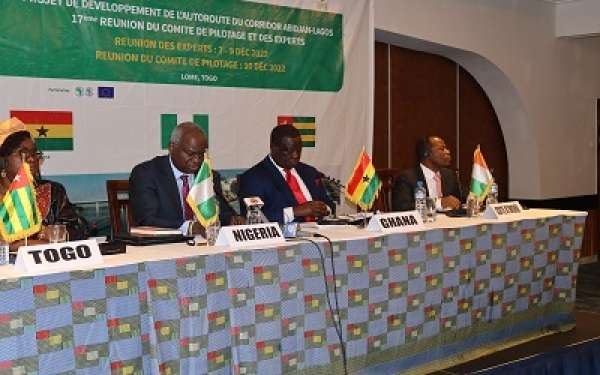Minister for Roads and Highways Kwasi Amoako-Atta, is pushing for land acquisition cost and compensation for affected persons to be included in the Abidjan-Lagos Corridor Highway Development Project.
1,028km Lagos, Accra, Cotonou, Lome and Abidjan
The Abidjan-Lagos Corridor covers a total distance of 1,028km and connects some of the largest and economically dynamic cities in West Africa namely Lagos, Accra, Cotonou, Lome and Abidjan.
$15.6bn project
The $15.6 billion project is expected to be financed through a Public, Private Partnership (PPA) agreement.
On the process to acquire and secure the Right of Way for the Project by Member States, the Steering Committee agreed to a deadline of end of May 2023 to complete the process of securing and gazetting the Right of Way within the respective countries.
According to Amoako-Atta, the Ghana section constitutes over 50% of the entire length of the corridor.
17th Steering Committee Meeting
He made the call at the 17th Steering Committee Meeting of the Abidjan-Lagos Corridor Highway Development Project held from on December 2022 in Lome, Togo.
Entire cost of land acquisition cost and compensation
Amoako-Atta argues that expecting the respective member states to bear the entire cost of land acquisition cost and compensation will delay the project.
He said considering the likely huge cost that can be involved in compensating the affected properties, it will be difficult for Ghana Government to provide those funds in a relatively short period for the project to be executed in good time.
“We have put a team together to start marking the alignment, stakeholder engagements and documenting the affected persons to assess the number of people as well as the properties that could be affected,” he said.
Feasibility and detailed design studies
Amoako-Atta stated that a lot of good progress has been made in the feasibility and detailed design studies and applaud the ECOWAS infrastructure team, the Project Implementation Unit (PIU) and technical Directors for the consistent efforts they are making to ensure the success of this project.
Ghana’s section is the most economically viable route
An assessment of the economic viability of the Abidjan Lagos Corridor Highway Development Project has identified Ghana’s section of the planned road infrastructure as the most economically viable route under the project.
Ghana’s section is 520 kilometres
The country’s 520 kilometres stretch of the project, which spans Yamoransa-Aboansa and Aburi-Afineya, emerged with an Economic Internal Rate of Return (EIRR) of 17% which is higher than the average of 15% for the entire project.
Economic Rate of Returns measures the profitability of investment of a project and usually, the World Bank and other development partners give a limit of at least 12%.
This means that if the rate of return is around 12%, then the private investor knows that when they invest a dollar in the project, they are going to get a return of more than 12 folds over a period of time.
Communiqué
In a communiqué issued at the end of the meeting, the Ministers and other Speakers affirmed their commitment to the implementation of the Abidjan-Lagos Corridor Project.
They recommended the exploration of innovative financing options such as tax credit for project financing as an incentive for private sector participation.
Ministers unanimously approved the commencement of the constitution of the Abidjan – Lagos Corridor Management Authority (ALCoMA) Board, and tasked ECOWAS to officially request nominations from Corridor Member Countries, to serve on the Board.
The Member States will have a deadline of 30th January, 2023 to submit their nominees.
On the location of the Headquarters of ALCoMA, the communiqué said ECOWAS will make the necessary arrangements to convene a meeting of the five (5) Heads of State and Governments to conclude the decision’
ECOWAS will present the result of the evaluation of the nominees to the Steering Committee for its decision scheduled for 10th March 2023.
On the issue of the Consultant’s Claims and Addenda to the initial Contract, the Steering Committee established a deadline not later than 31st December, 2022 for ECOWAS to provide documents required by the AfDB, not later than January 31, 2023 to give its final decision.
ECOWAS and Member State experts should ensure high quality of designs for the project considering the environment and the need to satisfy future needs.
75% of trade volume in West Africa
In order to facilitate transportation on this corridor which carries more than 75% of trade volume in West Africa, several interventions from ECOWAS, development partners and countries along the corridor have been undertaken over the years.
These include road infrastructure improvement, border posts restructuring and soft transport facilitation interventions to improve the free flow of persons, trade and transport.
It is for this reason the head of states of these five West African Countries came together to construct a six lane highway on the corridor.

